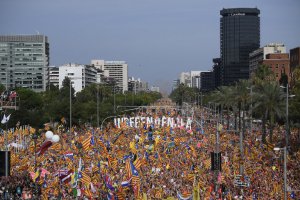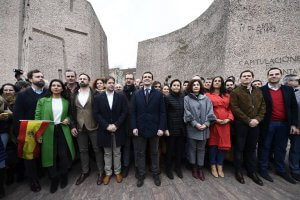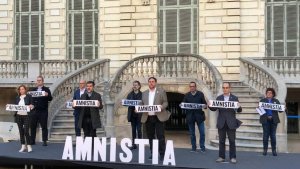All the Catalan pro-independence groups participating in the elections to be held in Catalonia this Sunday 14 February have signed an agreement to not form a government with the Catalan Socialists (PSC), headed by Spain’s former health minister, Salvador Illa.
The agreement, signed by Junts per Catalunya (JxCat), the Esquerra Republicana (ERC) party, PDeCAT and CUP, states that ‘no matter what the results of the polls may be, in no case will an agreement be reached with the Socialists’. It was drafted by an association called Catalans for Independence and signed by the presidential candidates Laura Borràs (JxCat), Àngels Chacón (PDeCAT) and Dolors Sabater (CUP), as well as ERC’s communications secretary Sergi Sabrià. The document states that the parties had made a commitment to achieve Catalan independence in 2017 but were ‘unable to develop a joint strategy’ for that aim or a joint strategy to ‘face Spain’s repression’.
Salvador Illa, the former health minister now leading the PSC party in Catalonia, denounced the pro-independence pact, calling it ‘an error’ and the parties of ‘perpetuating hatred and decadence’.

Speaking on Antena 3 television and Cadena SER radio on Thursday, Illa compared the pro-independence pact to that reached by Spain’s far-right Vox party, the right-wing People’s Party (PP) and centre-right Ciudadanos Cs, for barring the PSOE socialists from governing in Andalusia after they failed to win an absolute majority in the 2018 regional election.
The leaders of Vox (Santiago Abascal), the PP (Pablo Casado) and Cs (at the time Albert Rivera), were photographed together during a ‘United Spain’ march held in Madrid’s Plaza Colón on 10 February 2019, inspiring Illa to also describe the Catalan pact as ‘the pro-independence force’s Colón photo’.

The two main pro-independence parties, JxCat and ERC, currently form a coalition government in Catalonia, but opinion polls are split on who could win on 14 February.
JxCat and ERC are seeking to win more than 50% of the vote for the first time, but some polls have seen Illa winning. The latest predictions show a three-way tie, with JxCat, ERC and the PSC socialist party each winning between 20-22% of the votes.
ALSO READ: Catalan election campaigns underway – as jailed leaders seek amnesty

Details of all parties in the Catalan election
There are 135 seats in the Catalan Parliament – with 68 required for an overall majority. The presidential candidates and each party in the Catalan elections are as follows:
Pere Aragonès for the Esquerra Republicana (ERC) party. The head of the ERC party, Oriol Junqueras, is still in prison for his role in the 2017 Catalan independence referendum (although participating in the campaign). Aragonès is also the current ‘interim president’ of the Catalan government, following the banning from office of Quim Torra in September. The ERC currently hold 32 seats in the Catalan Parliament. ERC are a left-wing, pro-independence party. They prioritise dialogue with Spain in an attempt to agree on a framework for establishing an independent Catalan Republic. A repeat of the coalition with JxCat is difficult, as the relationship between the two parties has deteriorated over the last two years, mainly over differences on how to engage with the central government in Madrid.
Carlos Carrizosa for the Ciudadanos (Cs) party, currently with 36 seats – more than any other group. However, they were unable to form a government after the last election. The Cs are centre-right and harsh critics of the independence movement, refusing to engage in any dialogue with them.
Laura Borràs for the Junts per Catalunya (JxCat) party (still led by Carles Puigdemont, who is in exile in Belgium and now an MEP) – currently with 29 seats. Borràs is currently an MP in the Spanish Congress in Madrid. The pro-independence JxCat are likely receive votes from supporters of the historic Convergència CDC party that ruled Catalonia for many years following the return to democracy in the 1970s.
Salvador Illa for the Catalan Socialists (PSC) party. The PSC currently have 17 seats. The party has a left-leaning social-democrat ideology, and also vouch to maintain Spanish unity – although they engage in dialogue with the pro-independence groups.
Jéssica Albiach for Catalunya en Comú-Podem (CatECP), currently with 8seats. CatECP are the Catalan branch of Spain’s left-wing Podemos party, in coalition with the PSOE in the Spanish government. The group was formed out of anti-austerity anger following the handling of the 2008 financial crisis. The party are in favour of self-determination and would allow the Catalan people the right to hold a legal referendum. CatECP are the parliamentary branch of the party of Ada Colau, mayor of Barcelona. The party portrays a left-wing, anti-globalisation and feminist ideology. CatECP could play a role in a potential left-wing coalition governing Catalonia following the election.
Àngels Chacon for the PDeCAT party, currently with 5 seats. The party is in favour of a Catalan Republic, but favour a more moderate approach compared to JxCat.
Dolors Sabater for Candidatura d’Unitat Popular & Guanyem (CUP), currently with just 4 seats. CUP are a far-left, anti-capitalist, pro-independence party that make up part of the opposition in the current Catalan Parliament, but still ensured that the current government is a pro-independence bloc between ERC and JxCat following the elections in 2015 and 2017.
Alejandro Fernández for the right-wing People’s Party (PP), currently holding just 4 seats in Catalonia. The PP are expected to pick up more seats, possibly from Cs. It was under a PP central government in Spain that the October 2017 independence referendum took place – banned by former Prime Minister Mariano Rajoy, who then applied direct rule on Catalonia under Article 155 of the Spanish Constitution.
Ignacio Garriga for the Vox party – currently not holding any seats in the Catalan Parliament, yet Spain’s third largest party. Vox is a far-right party with anti-immigration and Eurosceptic stances.
Click here for all our reports on: Catalan Independence, the Catalan Trial, verdicts and sentencing
